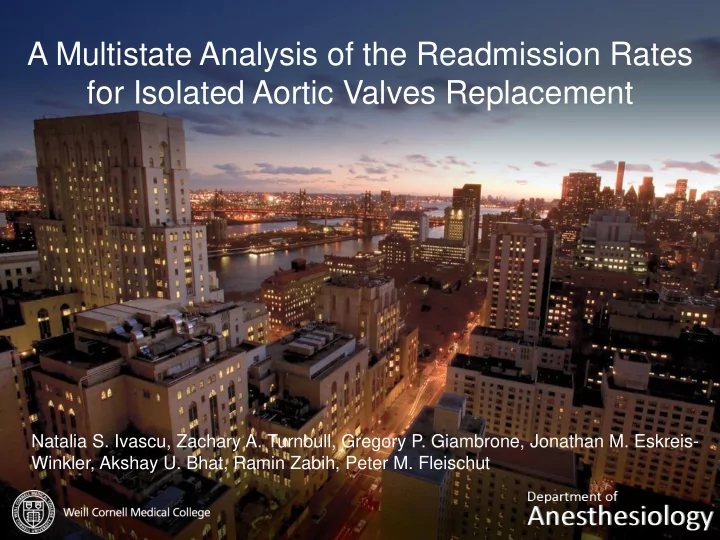

A Multistate Analysis of the Readmission Rates for Isolated Aortic Valves Replacement Natalia S. Ivascu, Zachary A. Turnbull, Gregory P. Giambrone, Jonathan M. Eskreis- Winkler, Akshay U. Bhat, Ramin Zabih, Peter M. Fleischut
Introduction • Readmission to the hospital is a costly part of cardiac surgical care • Readmission rates are also used as an alternative to in-patient mortality rates to measure delivery of quality care We sought to examine incidence and indications for readmission in the first 30 days after aortic valve replacement
Database • Analyzed the State Inpatient Databases (SID), Healthcare Cost and Utilization Project, Agency for Healthcare Research and Quality • Contains records of patients discharged from non-federal, non-psychiatric community hospitals • More than 100 clinical/non-clinical variables • AVR chosen to select a more homogenous study population with a large sample size
Methods • Retrospectively reviewed all isolated aortic valve replacements (AVRs) – 2009-2011 – California, Florida and New York • Re-admissions within 30 days – Average length of stay (LOS) for index and readmission – Identify most frequent ICD-9 codes listed for readmission
Results • 47,581 isolated AVR patients • Overall 30-day mortality 2.6% • Discharge disposition of index admission Home with services 43% SNF 23.5% Home without services 17% Rehabilitation 10.7%
Reasons for Readmission • Readmission by 30 day in 8.8% of patients • Average LOS for index admission: 10.2 d • Readmission average LOS: 6.9 d • Primary dx code at readmission: – Atrial fibrillation 7.9% – Congestive Heart Failure 6.5%
Implications and Next Steps • Cost analysis of re-admission vs in-home health care/follow-up • Investigate correlation between index LOS and likelihood of re-admission • Relationship better discharge location and likelihood of re-admission
Limitations • Variable criteria for re-admission across institutions • Data entry errors • Secondary data source • Narrow scope of study
Recommend
More recommend